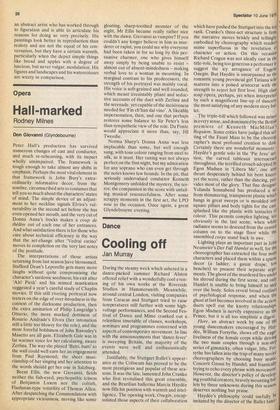Opera
Hall-marked
Rodney Milnes
Don Giovanni (Glyndebourne) Peter Hall's production has survived numerous changes of cast and conductor, and much re-rehearsing, with its impact wholly um impaired. The framework is tough enough to take almost any shifts in emphasis. Perhaps the most vital element in that framework is John Bury's extraordinarily informative decor, from the sombre, circumscribed sets to costumes that tell you so much about the characters' states of mind. The simple device of an adjust
ment to her neckline signals Elvira's vulnerability in the second act before she has even opened her mouth, and the very cut of Donna Anna's frocks makes a coup de theatre out of each one of her entrances. And what satisfaction there is for those who care about technical efficiency in the way that the set-change after 'Vedrai carino' moves to completion on the very last notes of the postlude.
The interpretations of those artists returning from last season have blossomed. Stafford Dean's Leporello gets many more laughs without quite compromising the character's sardonic seediness; his exit after 'Ali! Pieta' and his mimed mastication suggested a year's careful study of Chaplin movies. If this still riveting portrayal now teeters on the edge of over-broadness in the context of the darksome production, then the extra amination of Philip Langridge's Ottavio, the more marked dottiness of Rosario Andrade's Elvira (her intonation still a little too blowsy for the role), and the more forceful bolshiness of John Rawnsley's Masetto are all gain. Elizabeth Gale was in far warmer voice for her calculating, aware Zerlina. The way she played `Batti, batti' to the wall could well earn her an engagement from Paul Raymond; the sheer musicianship of her singing and her attention to the words should get her one in Salzburg.
Brent Ellis, the new Giovanni, fields neither the fish-eyed, psychopathic iciness of Benjamin Luxon nor the coltish, Flashm an-type volatility of Thomas Allen. After despatching the Commendatore with appropriate viciousness, moving like some gloating, sharp-toothed monster of the night, Mr Ellis became really rather nice with the dawn. Giovanni as vampire? If you couldn't any longer believe in him as murderer or rapist, you could see why everyone had been taken in for so long by this persuasive charmer, one who gives himself away simply by being unable to resist — almost out of absent-mindedness — making verbal love to a woman in mourning. In marginal contrast to his predecessors, the strength of his portrayal was mainly vocal. His voice is soft-grained and well rounded, which meant irresistably pliant and seductive accounts of the duet with Zerlina and the serenade, yet capable of the incisiveness needed for 'Fin ch'han dal vino'. A likeable impersonation, then, and one that perhaps restores some balance to Sir Peter's less than sympathetic view of the role. Da Ponte would appreciate it more than, say, Jill Tweedie.
Norma Sharp's Donna Anna was less implacable than some, but well enough sung, with tone colour ranging from steel to silk, as it must. Her tuning was not always perfect on the first night, but my admiration for any soprano who can even get through the notes knows few bounds. In the pit, that seriously undervalued conductor Kenneth Montgomery unfolded the mystery, the ter ror, the compassion in the score with unfailing musical resourcefulness. After some scrappy moments in the first act, the LPO rose to the occasion. Once again, a great Glyndebourne evening.


































 Previous page
Previous page